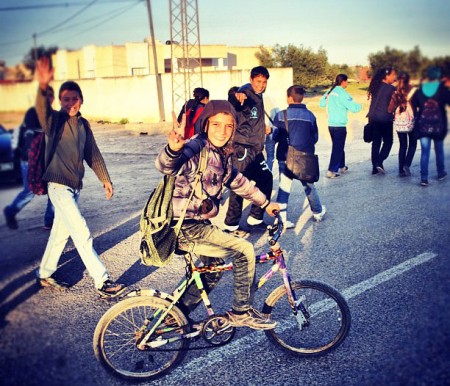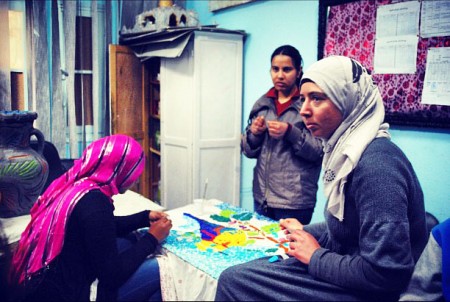Tunisia’s forgotten youth
In the past few years, investment in the education sector in Tunisia has amounted to 7% of GDP. However, with the exception of the larger cities, once young people leave school, they have to face the stark reality that the countryside is blighted by unemployment. This report comes from the Sfax region.

School trip to Jebeniana
They have hardly had time to wolf down their snack when the bell, of the fire alarm type, rings to end recess. The 120 pupils at the Jberna primary school, a small village 40 km to the north of Sfax, immediately jump to line up in front of their classrooms, boys on one side, girls on the other. Almost all come from families living in poverty. “Their parents are farmers or fishermen, but mostly unemployed”, explains Amine, the youngest of the four teachers at the school. “Most of these children have never been out of the village. They’ve never even been to Jebeniana, the closest city, just eight kilometers away.”
Economically speaking, the Revolution hasn’t yet changed anything for children in villages like Jberna. The progress of the children, who learn French alongside Arabic from when they begin school, often stagnates due to a lack of support from their parents, who are unable to provide them with adequate working conditions at home.
End of recess at the Jberna primary school
A few kilometers away, in the Jebeniana establishment called Cité Jardins, one finds a completely different atmosphere. In the computer room, the pupils in first year of preparatory training (the equivalent of middle school), are working on formatting a text in French, two students per computer. Here the problems are more of a political order. “Before the Revolution the government was more interested in the private schools, because they were for the rich people”, commented Mr. Salem, the school’s new principal. “Today we’re trying to set up computer rooms and labs in schools for poorer kids.”
Mr. Salem has been principal of Cité Jardins since the fall of Ben Ali. When the events of December 2010 took place, the pupils took part in the demonstrations in Jebeniana, even though the principal at the time had forbidden it. He was a member of the RCD. “Our trade union, the UGTT, managed to get the former principal expelled during the administrative void that followed the Revolution”, explains Mohamed Zaatour, who teaches Arabic. The principal left the school when Ben Ali left the country. “Before, the principal was always chosen for political reasons. He made all decisions on his own and reported everything to the police. We told all of those people to get out.”

“Most importantly, we have to prevent politics from entering the school”
The legacy left to the new principals and teachers at such schools leaves them with very little to go on; they have very little in the way of equipment or infrastructure, and difficult working conditions. “We are trying to change what we can in our country’s schools” adds Mr.Salem. We have filed requests for bigger classes, for improvements in transportation, and all the teaching material we can get. Take the library, for example, before, some books were mandatory, others were forbidden. The children never went near the library.”
The new principal’s main task is to stop politics from entering the school. “For decades, the UGTT had been demanding that school principals not be members of political parties. Today the teachers can do their jobs without any form of outside interference. The children can talk to them and make suggestions. We are trying to empower all of the students, to turn them into future citizens.” Of course it takes more than a year to change everything. This is the case with the school curricula. Schools are still using the textbooks from Ben Ali’s time, but the teachers’ trade union is working alongside the Ministry of Education to update the teaching material. “It will take time to change Tunisia,” sighs Mr. Zaatour. “For now, the Islamists cannot change the system or curriculum. They will try of course, but we will stand up to them.” Islamic initiation remains nonetheless one of the 14 courses taught at the middle school level.

In the Ellouza Youth Center
On days where there is no school, we get together at the youth center. In Ellouza, a small fishing village 15 minutes from Jebeniana, the multicoloured building welcomes young people between the ages of 6 and 28. Oisilla, who is 19 and has a diploma in Business English, has been looking for work since she finished university. “There isn’t much work around here: a lot of young people never find work after finishing their studies, so I spend time here with my girlfriends.”
The center offers artistic activities and sports facilities; girls do pottery and painting while the boys play ping pong or practice karate in the next room. “We don’t mingle. Friendship between boys and girls doesn’t happen. But I don’t mind” explains Hejer, who is 20. They all have cell phones and facebook pages, although many do not have internet access at home. They go online on the computers at the youth center, to chat or to listen to their favourite Arabic singers on MaghrebSpace, an online music site. The boys go to the café. Girls never do. At 5pm, they all go home.
In the town streets unemployed youths ride around on their mopeds or kill time listening to static filled music on their cell phones, leaning against graffiti-covered walls. On all their faces I see, the same boredom as the day before, and in all probability, the same as tomorrow.
This article was written by Romain Jeanticou and first published on Medinapart. Margaret Dunham and Katie Jackson translated and edited; all images courtesy of CFJ/C-H.G. or CFJ-R.J.







